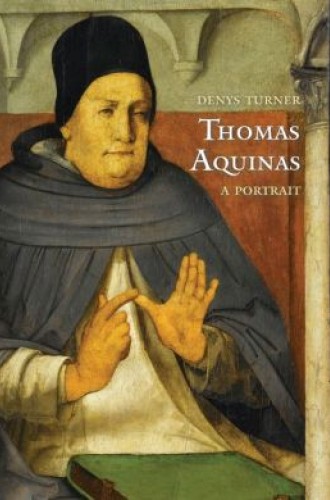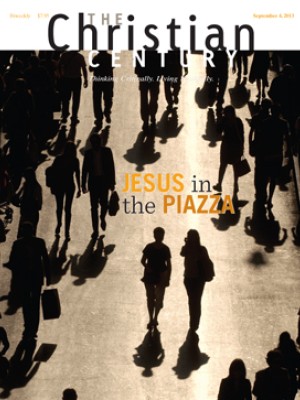Thomas Aquinas, by Denys Turner
The many biographies of Thomas Aquinas range from the popular and hagiographic to the scholarly. But all writers on the saint agree that Thomas was notoriously reticent about his own life. Almost never in his voluminous writings did he reveal a personal voice. It was thus brave of Denys Turner to subtitle his wonderful book “A Portrait.”
Turner recognizes the problem of Thomas’s taciturnity but thinks that one can find the person behind his writings in much the same way a keen listener can hear the silence behind music. Turner opens his book by saying—correctly—that the key to Thomas’s life and work is to be found in his life as a Dominican friar whose primary task was preaching. Thomas spent his entire adult life as a friar teaching younger friars who were preparing for the apostolate. In fact, as Turner notes, Thomas’s Summa Theologica was meant to serve as a model of theological instruction for that precise purpose.
Read our latest issue or browse back issues.
Those of us who have long studied the Summa are abashed to recall that in his introduction, Thomas declared that his work was designed for the “instruction of beginners.” Thomas’s role at the University of Paris (and later in Orvieto, Rome and Naples) was threefold: to read (that is, to interpret scripture), to dispute (to solve problems arising from the text) and to preach. Thomas also produced a number of biblical commentaries in addition to the Summa Theologica and his apologetic work known as the Summa contra Gentiles. It is for this reason that Thomas would have understood himself professionally not as a theologian but as a “Master of the Sacred Page”—that is, as a teacher of the Word.
The overall plan of the Summa Theologica has been the subject of much scholarly discussion. Turner provides us with a general vision of what Thomas had in mind. He argues that the Summa can be seen as a long, unfolding chain ordered by pedagogical considerations, with the unfolding of Thomas’s theological ideas determined by inference. This is why Thomas began with a consideration of God—the fundamental subject of his inquiry.
Many modern theologians, including Karl Rahner and Karl Barth, have criticized Thomas for this approach because a consideration of God without reference to the trinitarian God of revelation gives us, to borrow Pascal’s famous formulation, the god of the philosophers and not the God of Abraham, Isaac and Jacob. Turner, however, contends that Thomas proceeded in the way he did with the conviction that if one does not get God right, many problems will arise as the whole story of revelation unfolds.
One point on which Turner insists is that Thomas was a materialist. That seems to be a shocking claim given the way we understand materialism today. However, Thomas was a materialist in a different sense. He robustly argued that humans are whole persons, not bifurcated into bodies within which there are souls. Thomas did not accept overly Platonizing visions of the world, in which there are separate realms of inferior material reality and superior worlds of spirit. Turner goes back to this argument to shed light on everything from Thomas’s understanding of creation to his anthropology. Toward the end of the book he reminds us of this materialist conviction in Thomas’s brilliant discussion of the real presence of Christ in the Eucharist. Thomas, according to Turner, contended that you do not understand “the human meaning of food until you understand its Eucharistic depth; lurking within the quotidian business of meals is a mysterious dimension, waiting to be disclosed. The Eucharist discloses it.”
Some months before his death, Thomas put down his pen before he finished the last part of the Summa. Like Mozart’s Requiem, it was finished by others. When his secretary asked why he no longer wrote, Thomas is alleged to have said, “After what I have seen, all is straw.” Many have speculated that he had a stroke or a nervous breakdown or some sort of mystical experience. Turner does not further such speculations, but he has some profound words to say about that silence: “For Thomas, silence is not the absence of speech. It is what the fullness of speech demonstrates—namely, that even at its best, speech falls short; indeed, it is only speech at its best that truly discovers this silence.” Turner makes this observation in the early pages of his book then returns to the theme of silence in his epilogue summing up the holiness of the man: “Thomas stops short so that it would not be his word that his readers heard, but what in that silence he himself was always listening for, the Word of God in the matter that articulates it.”
Although Turner’s prose is clear and intelligible, his study of Thomas will make significant demands on those who have no prior knowledge of the saint or his work. For a comprehensive and systematic overview one might do better to read two volumes by Jean-Pierre Torrell that are now happily available in English: Saint Thomas Aquinas: The Person and His Work and Saint Thomas Aquinas: Spiritual Master. That said, Turner’s book is one of the best and most judicious attempts to come to grips with the formidable intelligence and patent holiness of the saint whom the tradition calls the angelic doctor. The Jesuit theologian Bernard Lonergan once remarked that he had spent much of his life “reaching up to the mind of Aquinas.” Turner clearly has reached up higher than most.






